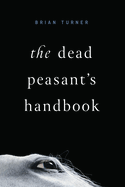
In Brian Turner's clear-eyed The Dead Peasant's Handbook, love is the key to surviving bereavement and wartime trauma. The collection, formatted in four thematic sections, is Turner's fifth poetry collection and the final installment--after The Wild Delight of Wild Things and The Goodbye World Poem--in an intimate, autobiographical trilogy. Part I, "On War & Conflict," depicts the lasting effects of cyclical violence: "What they don't tell you about war/ is how it outlives us." "Sunflowers," referencing Russia's military aggression against Ukraine, acknowledges that economic considerations can outweigh ideology: "a bank ledger/ might shape a decision tree./ The price of fuel. Sunflower oil." Collateral damage is wide-ranging, including Scottish-island sheep and the Bamiyan Buddhas, to whom the poet gives imaginative voice. Turner presents Part II, "On Dream," in the multi-part "Metal Fume Fever," which employs anatomical and marine vocabulary. Part III, "On Love & Loss," commemorates the death of Turner's wife, Ilyse Kusnetz, using lines from her own poetry. The phrasing connects to the earlier poems about conflict: "What they don't tell you about love/ is how our bodies house the dead."
Turner varies his line lengths and stanza forms, and wields repetition as a rhythmic rhetorical strategy: alliteration and recurring horses and the looping sentences of "Call It Leaves and Rain" and "The Starry Starry Nights." The final section, "On Survival," contains alarming stories of a burning meth lab and a car accident. "All the Questions" marvels that Turner's sister fell from a plane and lived. Here, the weight of loss is counterbalanced by love and lucky breaks. --Rebecca Foster, freelance reviewer, proofreader, and blogger at Bookish Beck

